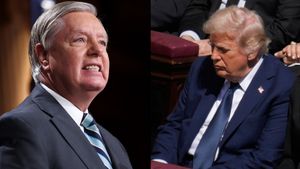CONTACTAbout UsCAREER OPPORTUNITIESADVERTISE WITH USPRIVACY POLICYPRIVACY PREFERENCESTERMS OF USELEGAL NOTICE
© 2025 Equal Entertainment LLC.
All Rights reserved
All Rights reserved
By continuing to use our site, you agree to our Private Policy and Terms of Use.
Church-affiliated social service organizations that receive state funding in Georgia will be prevented from discriminating against gay people or applicants of other faiths by the settlement of a lawsuit against the Georgia Department of Human Resources. The out-of-court agreement came Thursday, two days after Gov. Sonny Perdue proposed amending the state constitution because of concerns about legal challenges to government funding of church-run social services. The lawsuit came after a Methodist foster home in Decatur fired a female employee who is gay and refused to hire a Jewish therapist. Lawyers for the New York-based Lambda Legal Defense and Education Fund called the out-of-court agreement a victory. They said it does not change the law but requires the state to abide by the state and federal constitutions. "A private social service agency subject to the Department of Human Resources can't take government funds and use them to engage in religious programming or to fund positions where there is a religious hiring criteria," said Susan Sommer, a New York attorney for Lambda. The settlement does not mean "a Baptist church can't still require that a Baptist minister be Baptist," Sommer said. It just means that at social service organizations receiving state funding, "there can't be a sign on the door that says, 'No Jews allowed."' The United Methodist Children's Home Inc. in Decatur provides foster care to 70 children in state custody and gets 40% of its budget--more than $1 million a year--from the state. Aimee Bellmore claimed she was fired in November 2001 after the home discovered she is gay. Alan Yorker, a Decatur psychotherapist, said that when he applied for a job in October 2001, he was told the home did not hire Jews. Perdue announced Tuesday that he wants to change Georgia's constitution to follow the U.S. Constitution's less restrictive prohibitions against tax money going to religious-affiliated groups. An amendment would require two-thirds passage in both the house and the senate and then would have to win a majority vote from the public in the November 2004 general election.
From our Sponsors
Most Popular
Latest Stories
Trump HHS posts ‘so-called report’ pushing conversion therapy for trans kids
May 01 2025 10:36 AM
True
Poland's last 'LGBTQ-free zone' is no more
April 30 2025 4:24 PM
Trending stories
Recommended Stories for You












































































